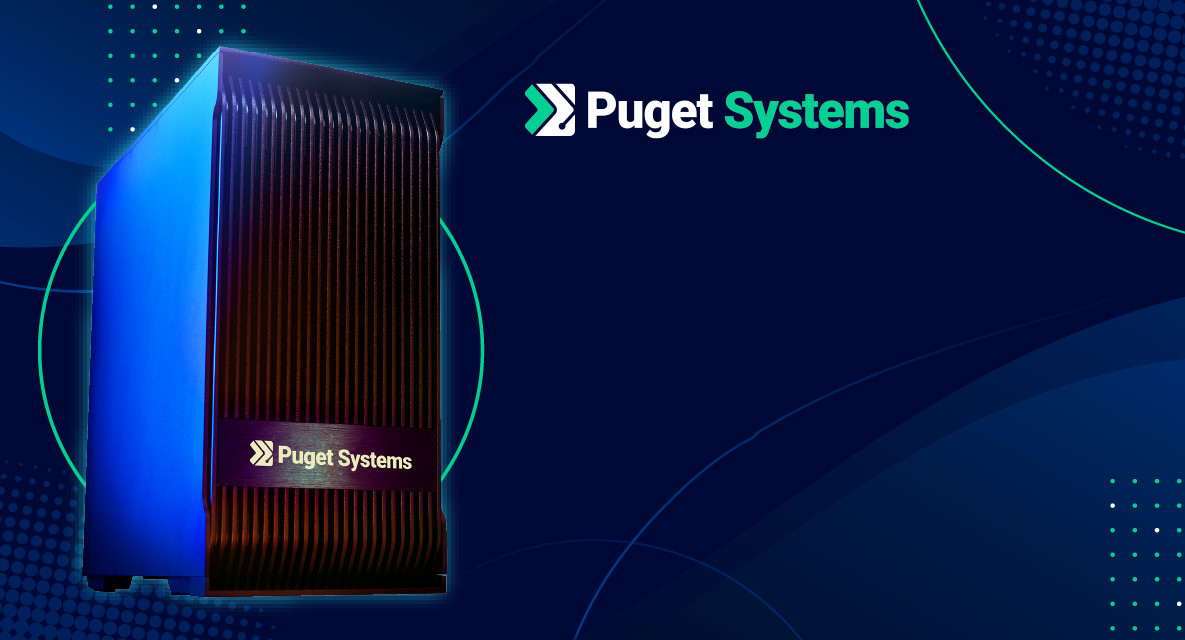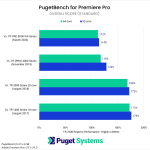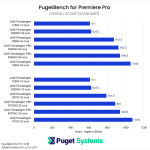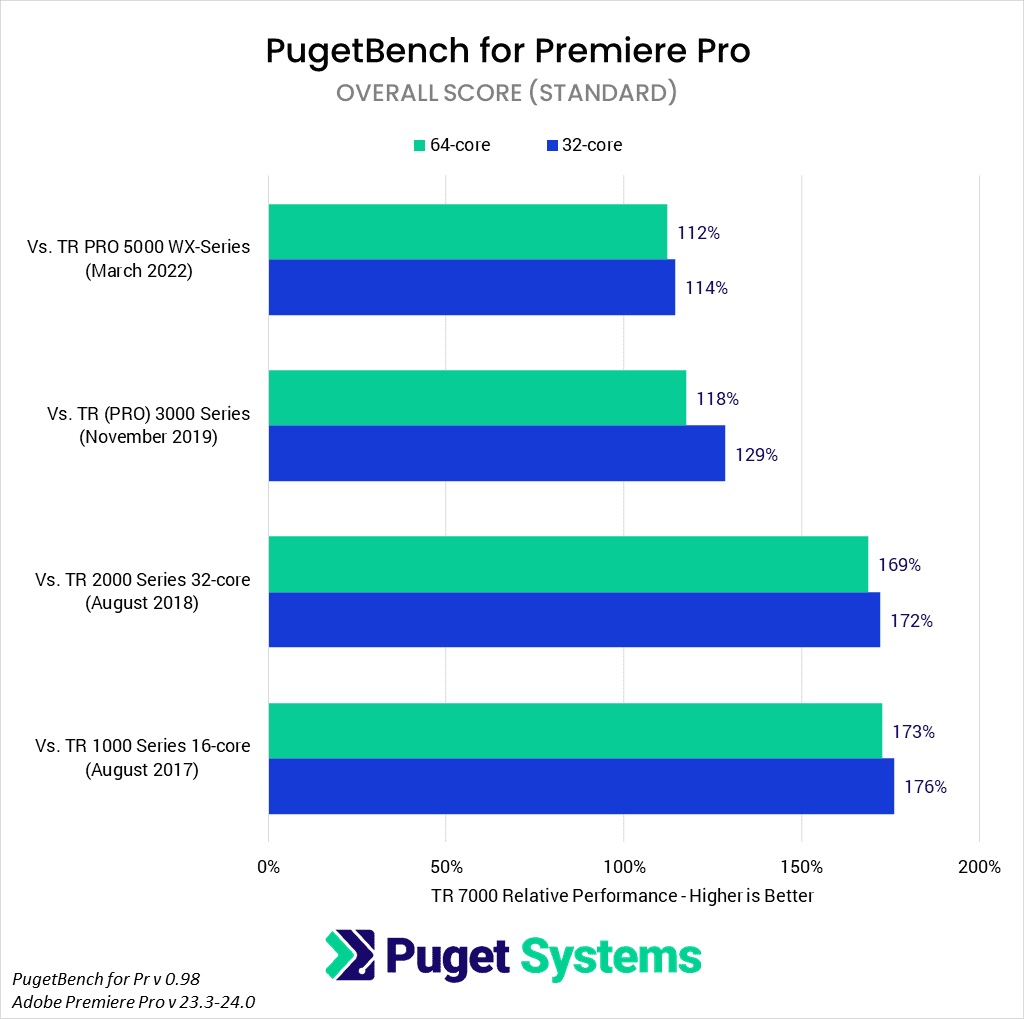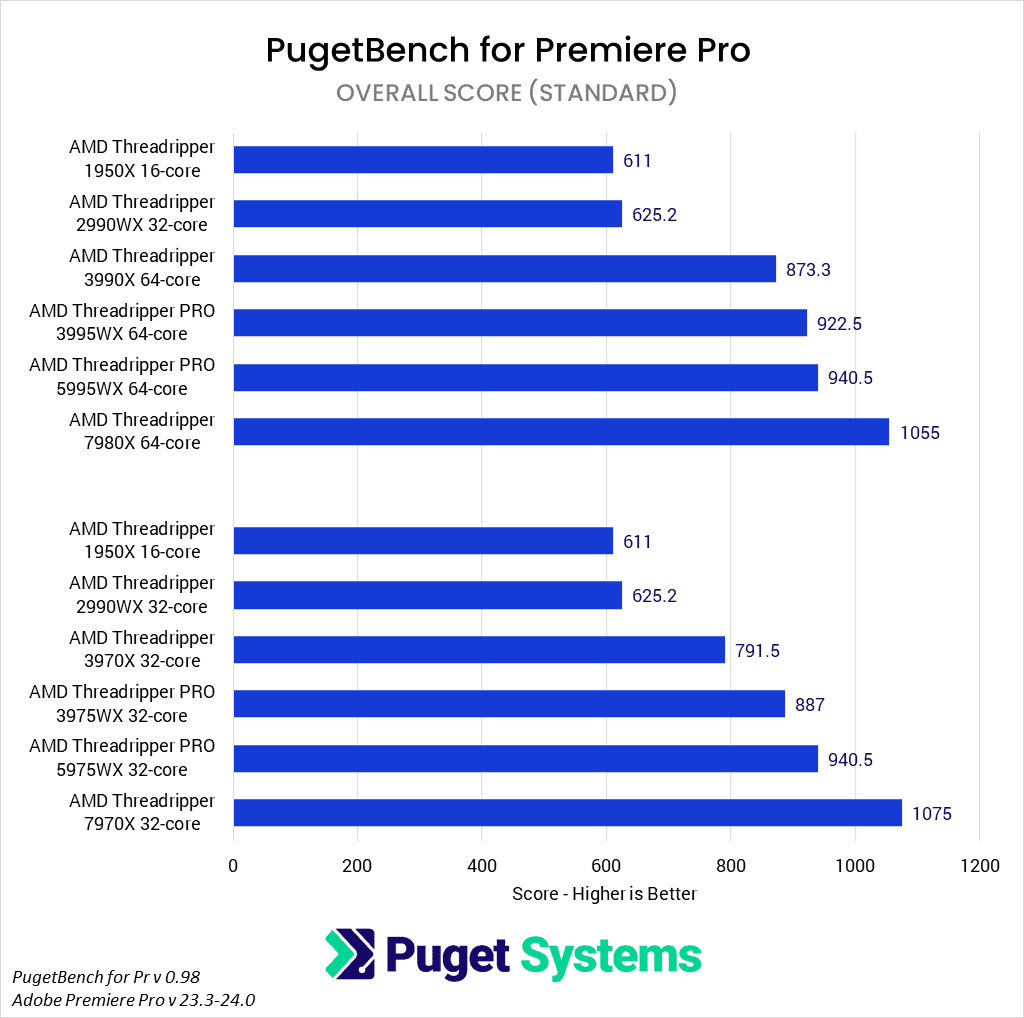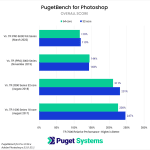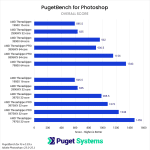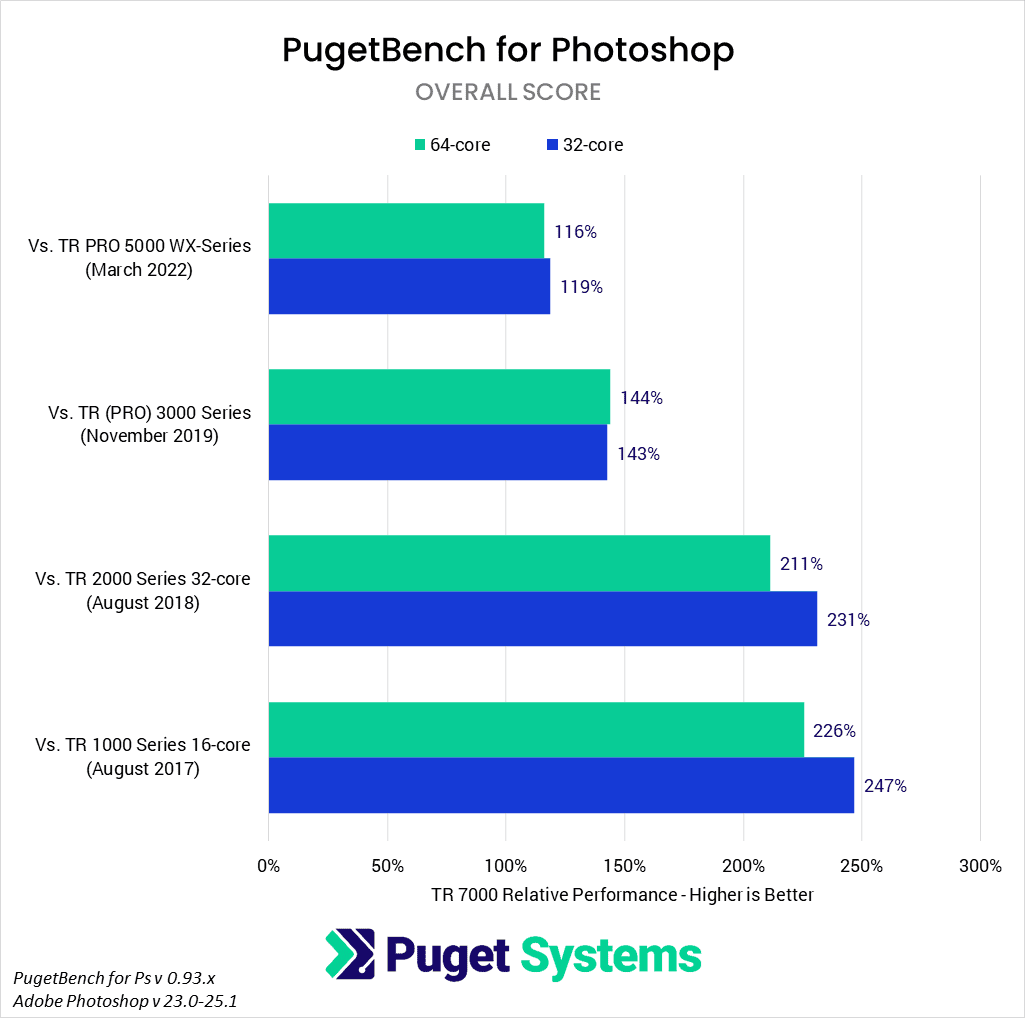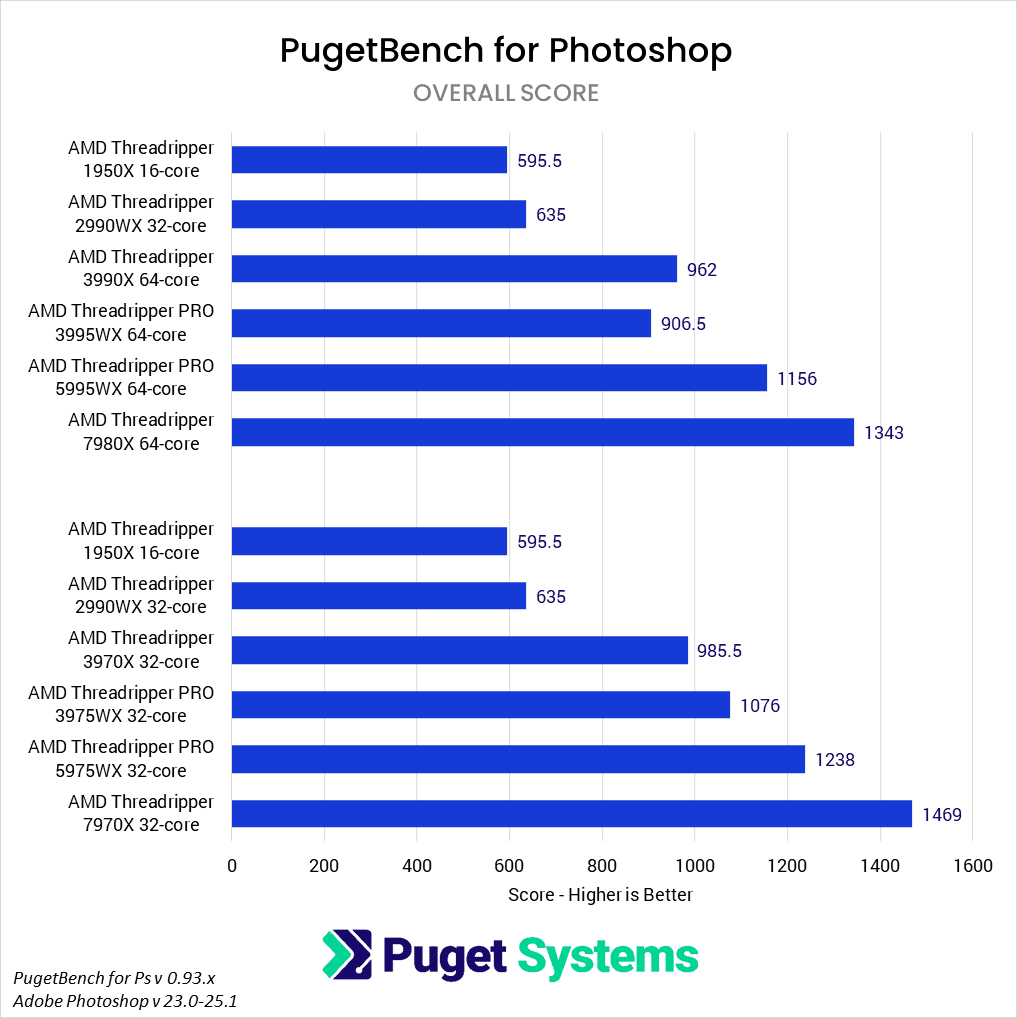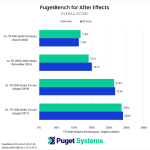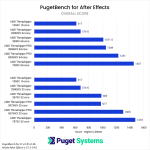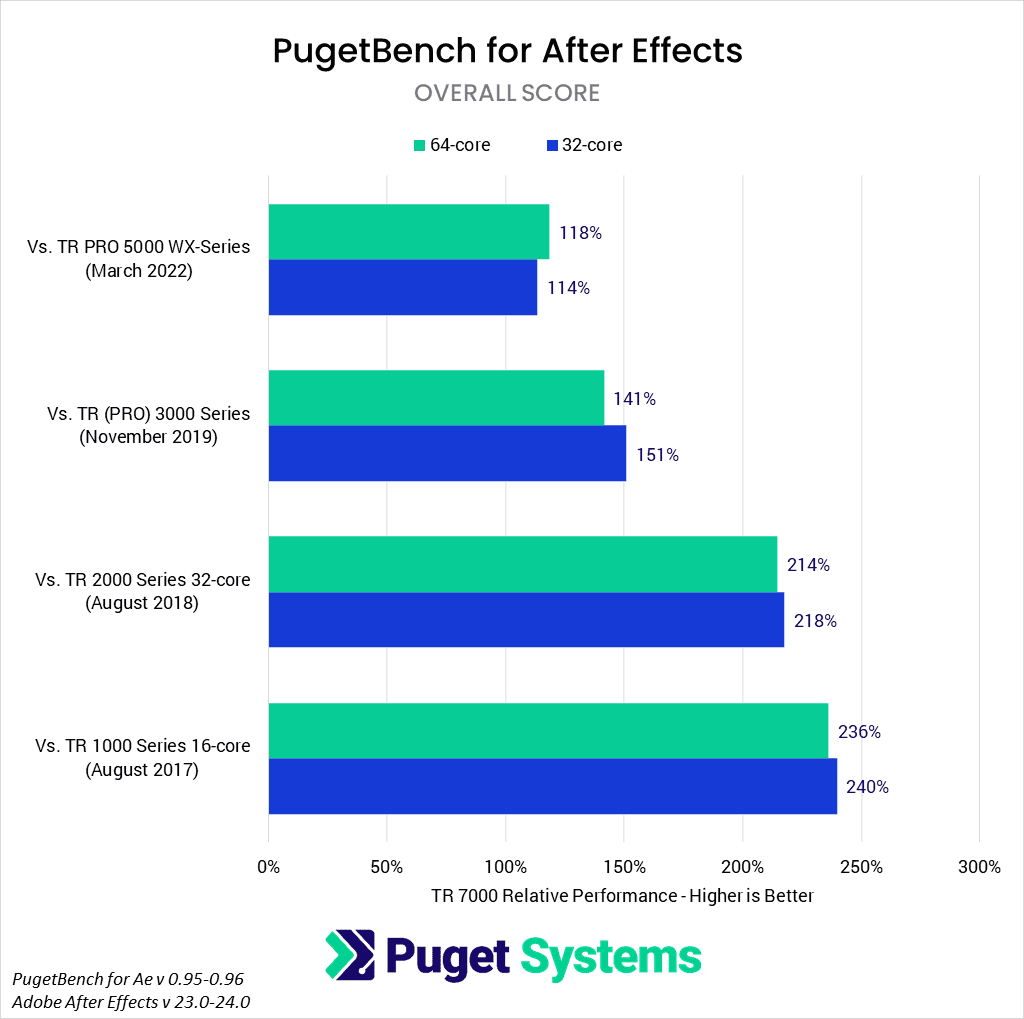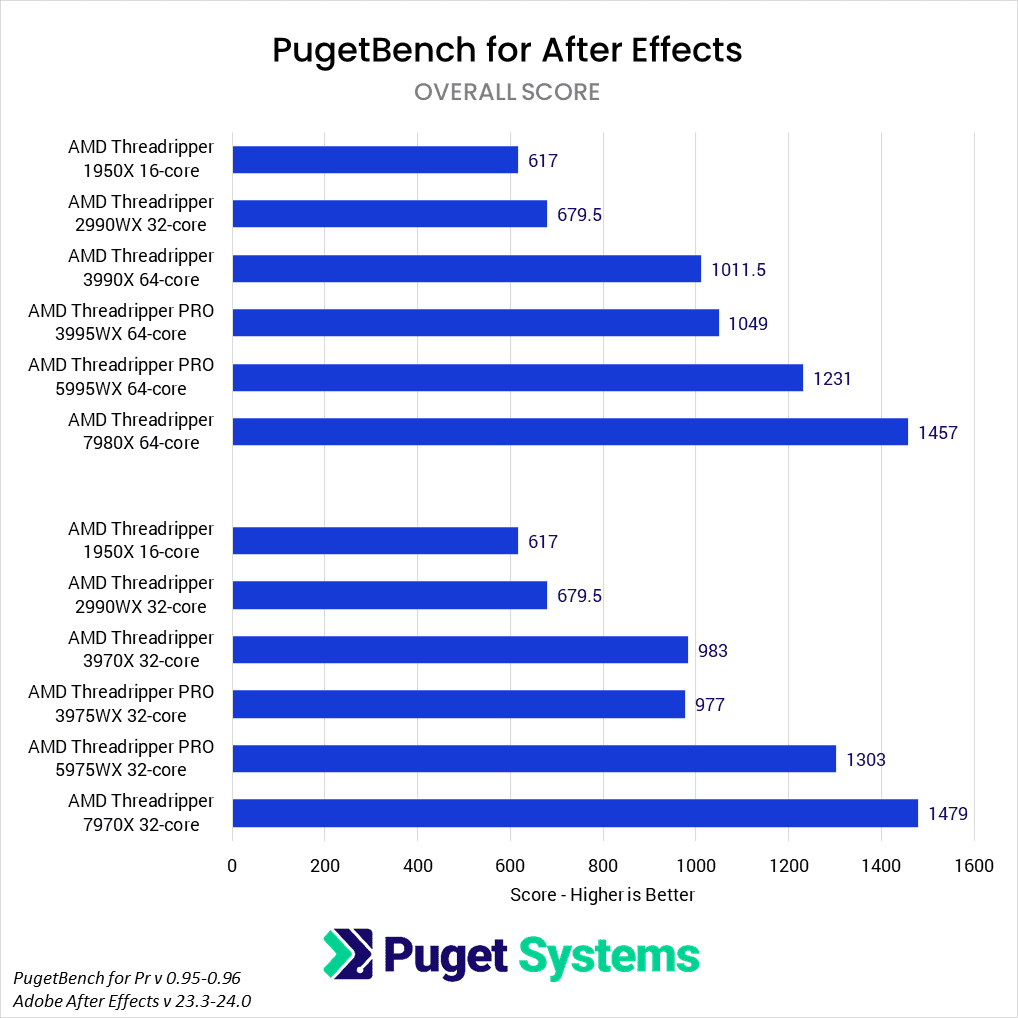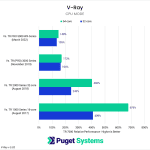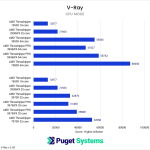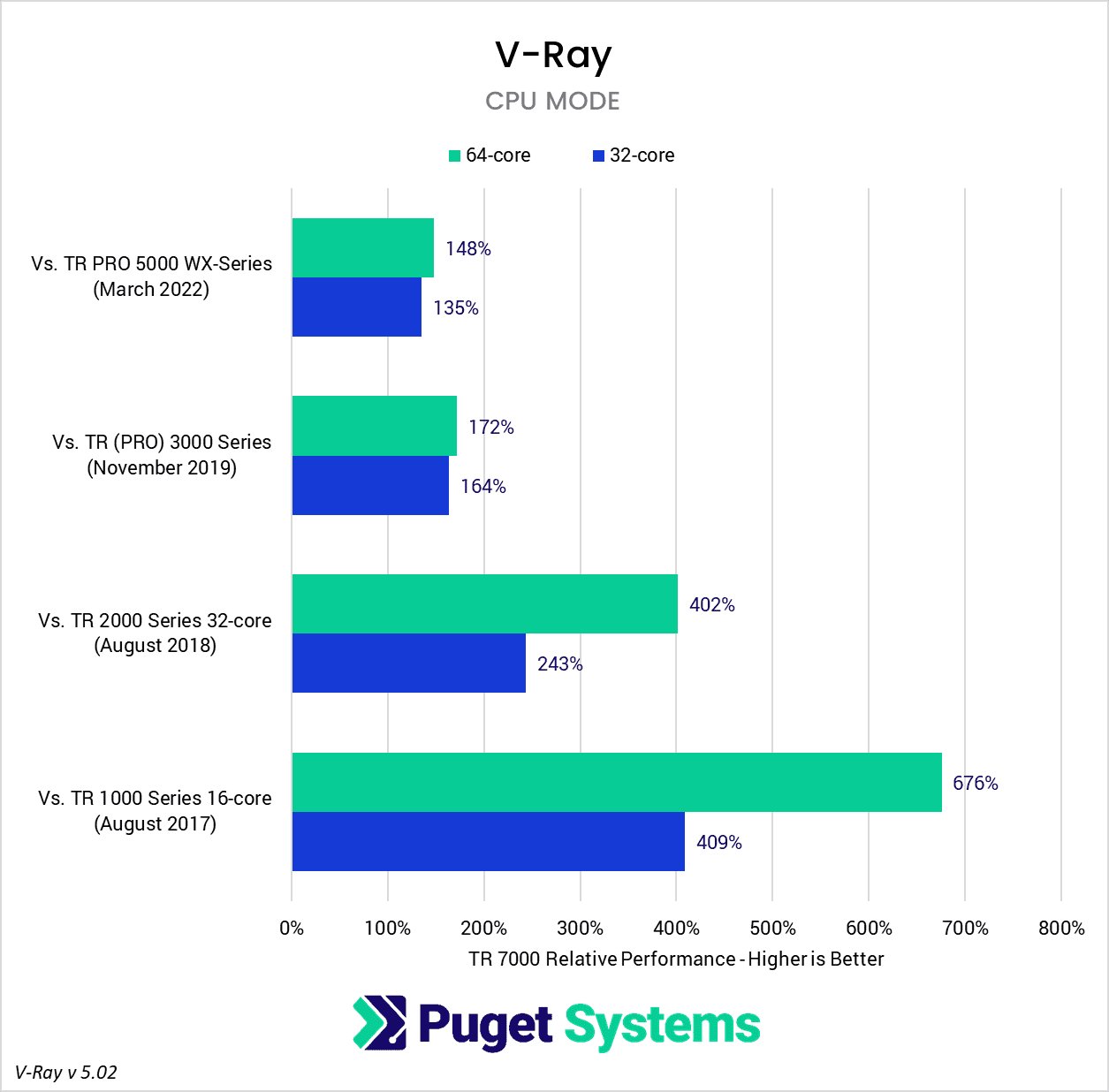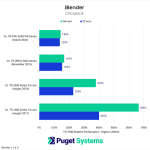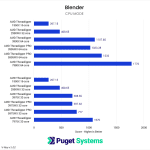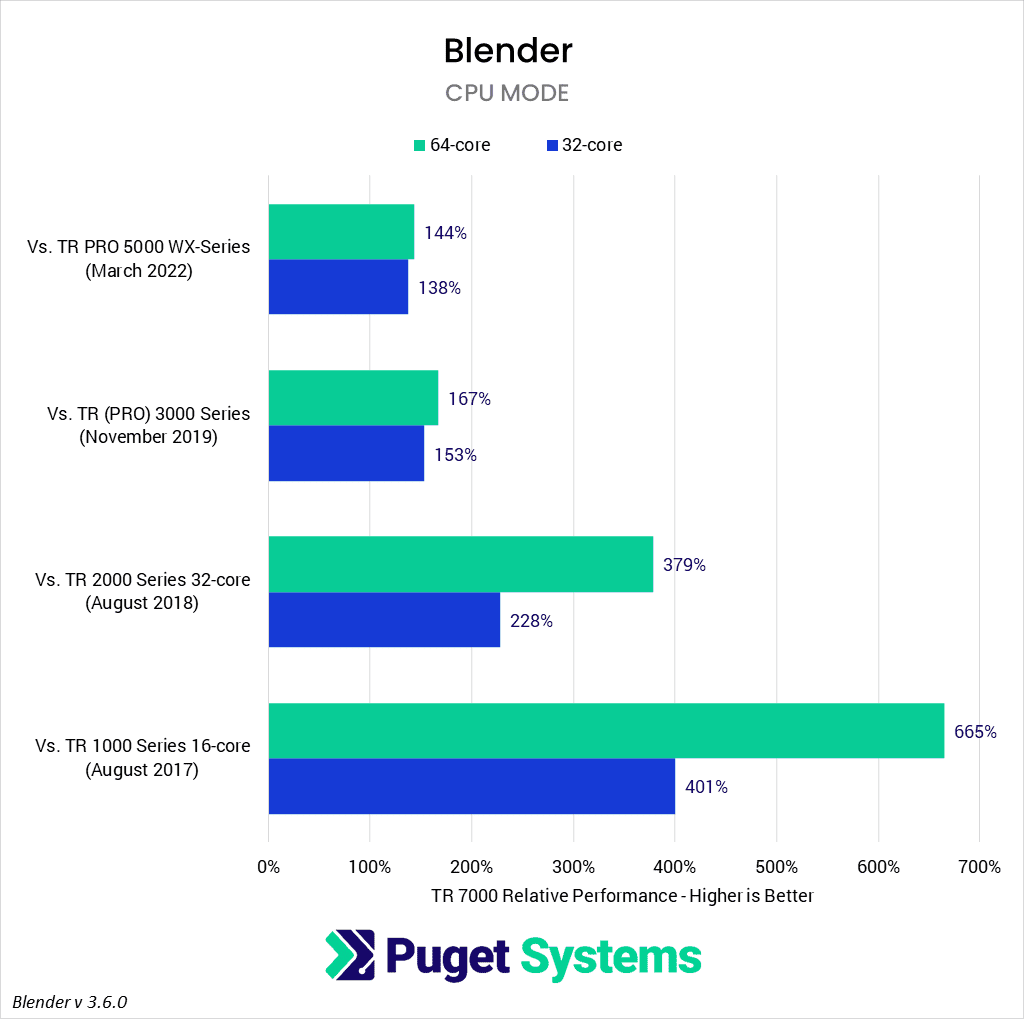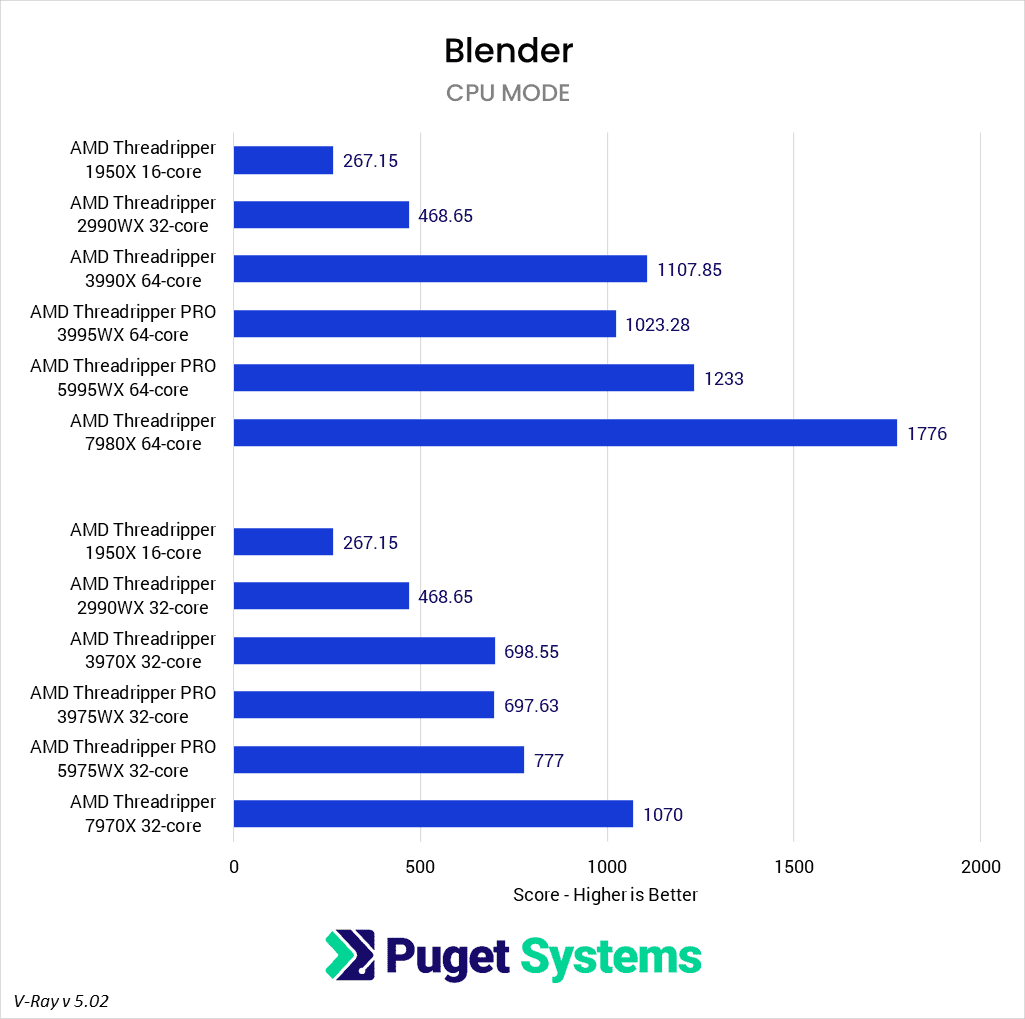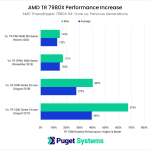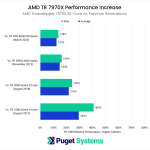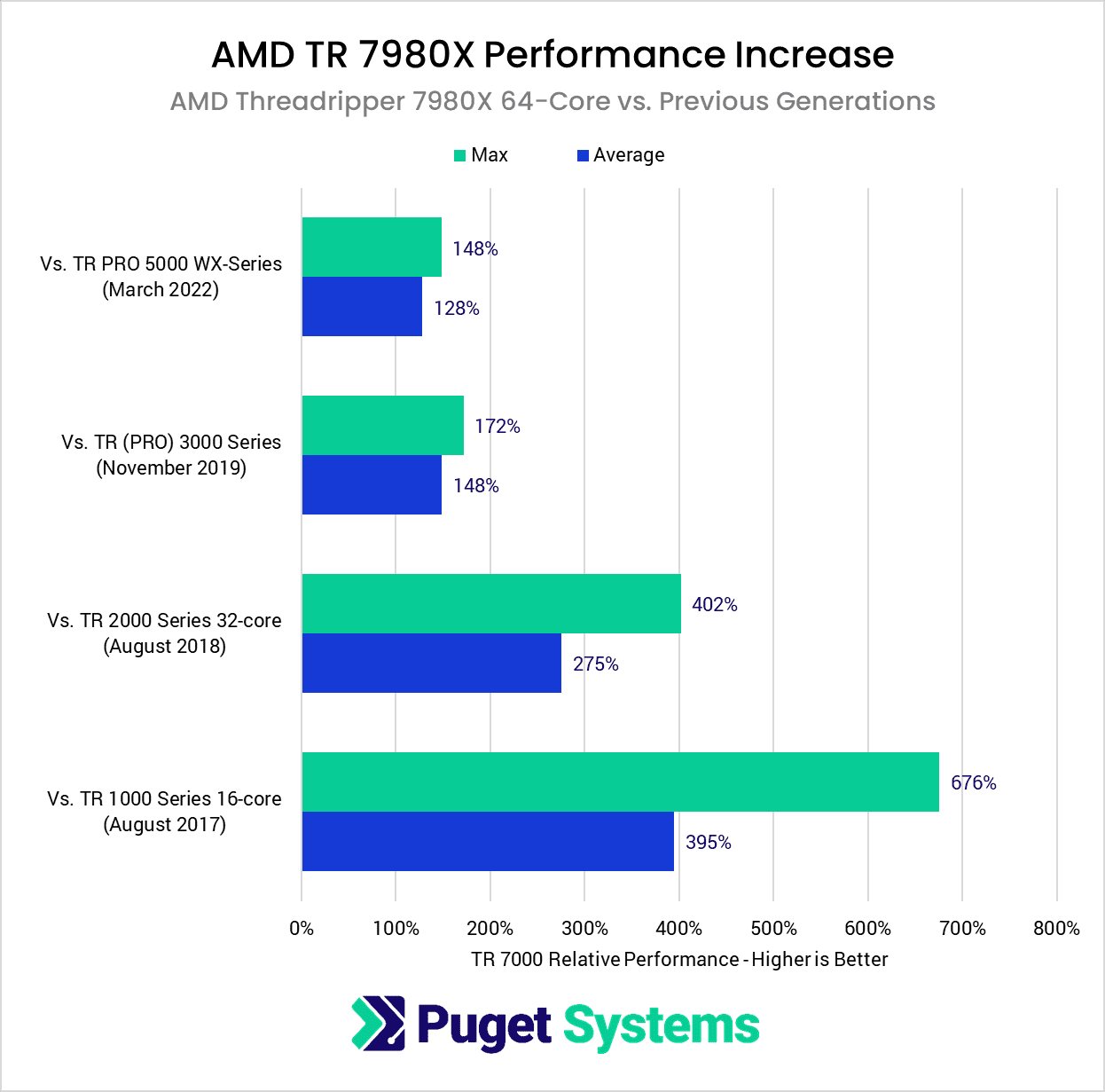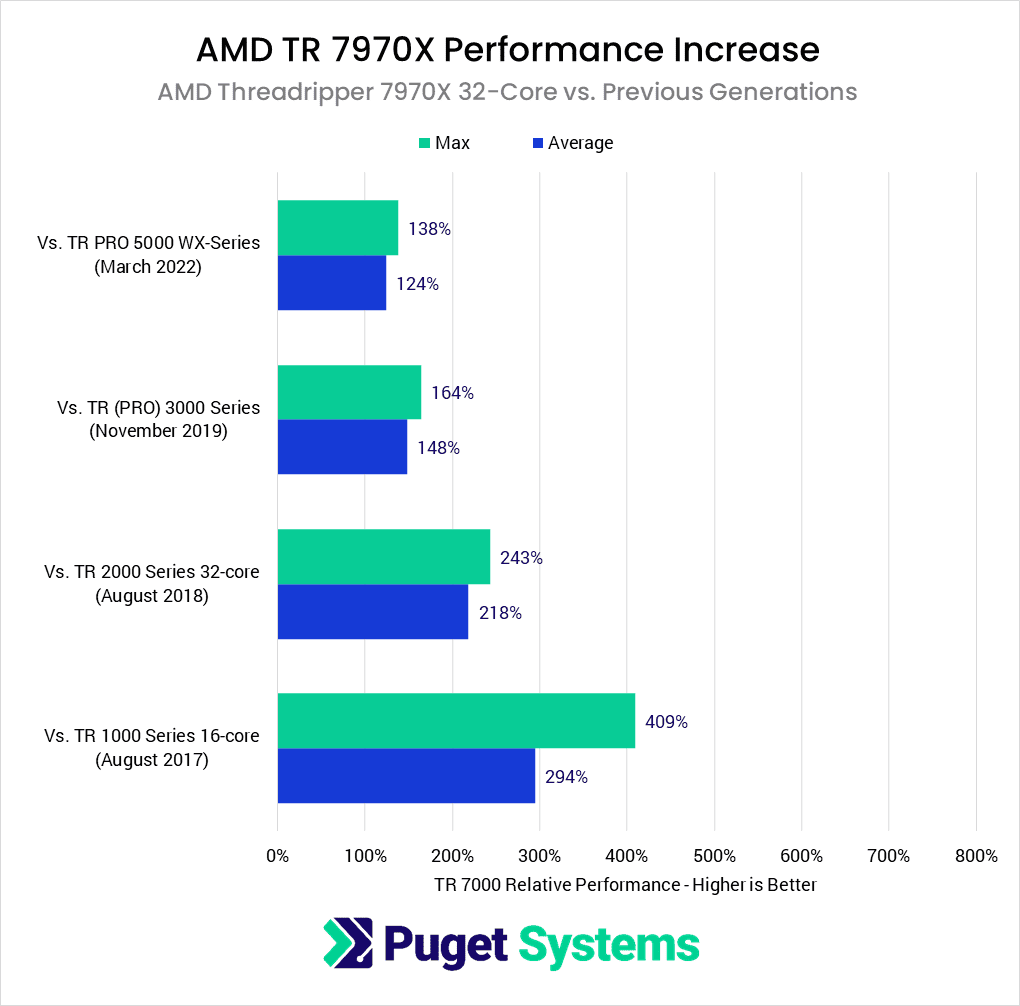Table of Contents
Introduction
In our recent AMD Ryzen Threadripper 7000 Content Creation Review article, we examined in-depth the new AMD Threadripper 7000 series of CPUs for various content creation workflows. As a part of that analysis, we did complete benchmark testing for not only the new Threadripper CPUs but also the previous generation Threadripper PRO 5000 WX-series and Intel’s latest Xeon W-3500 processors.
While that testing is critical and necessary to help people make the right CPU choice when purchasing a new workstation, one aspect it doesn’t touch on is how much faster one of these new CPUs is compared to a workstation that is more than a few years old. After all, it is rare for people to upgrade their system after only a single generation, so it can be hard to turn that data into a clear answer to the question “How much faster would a new workstation be compared to what I have now?”
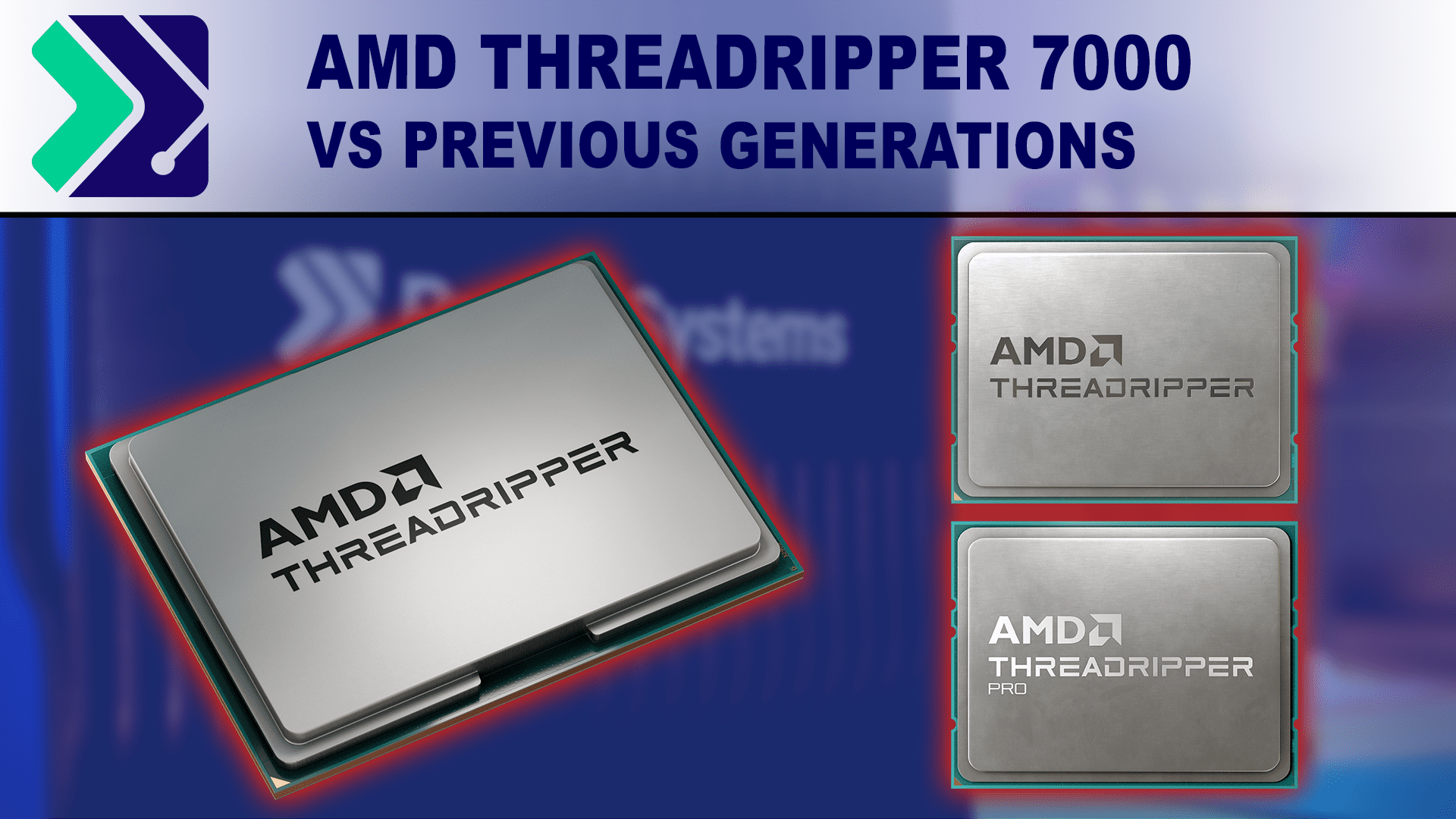
The best way to answer that question is to take the time to run benchmarks on your system so you can directly compare your current system’s performance. To facilitate this, most of the benchmarks we use in our articles are freely available for you to download and run. However, we understand that sometimes this isn’t feasible, or that you are simply looking for rough numbers to help you decide whether a system upgrade is worth investigating. If this is the case, we wanted to provide a resource to give you a rough idea of how the new AMD Threadripper 7000 processors compare to previous generations of Threadripper CPUs.
To do this, we used our results for the Threadripper 7980X 64-core, 7970X 32-core, 5995WX 64-core, and 5975WX 32-core, and supplemented them with results of the closest equivalent AMD Threadripper (PRO) 3000, 2000, and 1000 CPUs pulled from the PugetBench, V-Ray, and Blender public databases. To get enough results to draw gen-vs-gen performance comparisons, we had to be a bit loose on the benchmark and application versions we included, and we are not limited to a specific GPU, storage, or OS version. This will reduce the accuracy of our comparisons, so keep in mind that a 10-15% margin of error should be expected.
In addition, we are not considering the cost of the CPUs, which has risen with each generation. Nor are we factoring in inflation, motherboard cost, or anything else. If you are looking for more than ballpark results, we again encourage you to run the benchmark you are most interested in on your system directly. No comparison we can make will ever be as accurate as a result from your own system.
Download Benchmarks
If you want to see how your system directly compares, below are links to all the publicly available benchmarks we use as a part of our CPU testing. We will not be looking at all of these in this article (due to either a lack of public database, or there not being enough data), but you can compare all of them to the results in our AMD Ryzen Threadripper 7000 Content Creation Review article.
Adobe Premiere Pro
To start our gen-to-gen comparison, we wanted to start with Adobe Premiere Pro. Unlike the other applications we will look at in this article, Premiere Pro contains many tasks that are not primarily CPU-bottlenecked. For example, GPU effects and RAW processing heavily utilize the GPU, so the CPU you use doesn’t have as much of an impact. It still can matter, as does the capabilities of the overall platform, but the generational performance advantages will be a bit less for Premiere Pro than it is for the other applications.
Even with this caveat, it is very interesting to see just how much faster the Threadripper PRO 7970X 32-core and 7980X 64-core are compared to older Threadripper and Threadripper PRO processors. They are only 12-14% faster than the previous generation Threadripper PRO 5000 WX-Series, but this jump to about 20-30% faster when compared to the Threadripper (PRO) 3000 series.
Going back to the Threadripper 2000 and 1000 series which launched in 2018 and 2017, respectively, is where you really start to see a major performance jump with the new Threadripper 7000 processors. If you still have a system that old, you are looking at about a 70-75% performance increase, which will be extremely noticeable.
Adobe Photoshop
Unlike Premiere Pro, Photoshop is primarily a CPU-based application, even with the increasing addition of GPU acceleration over the last few years. Unlike the rendering applications we will look at later, however, it is lightly threaded so the performance gain over previous generations is more about the per-core and architecture improvements rather than the raw core count.
Even though Photoshop can’t take advantage of the massive number of cores included in Threadripper, the generational performance gains are very impressive. We are looking at about a 15-20% improvement over the last generation, but going back to late 2019/early 2020 Threadripper and Threadripper PRO 3000 series, the new Threadripper 7000 processors are a large 45% faster.
This jumps to over a 2x performance increase when compared to the Threadripper 2000 series, or as much as 2.5x if you go all the way back to the first-generation Threadripper.
Adobe After Effects
Similar to Photoshop, After Effects is primarily a lightly-threaded CPU-based application. It can utilize the GPU for some tasks, and has a new feature called “multi-frame rendering” that improves the multi-core capability in heavier projects, but most people have historically used Threadripper for the RAM capacity rather than the raw performance. In fact, Threadripper was often measurably slower with previous generations than a less expensive Intel Core or AMD Ryzen CPU, although that has changed somewhat with the new Threadripper 7000 CPUs.
Compared to the previous generations, we are looking at very similar results to Photoshop. 15-20% faster than Threadripper 5000WX, 40-50% faster than Threadripper (PRO) 3000, then a jump to 2.2x and 2.4x faster than Threadripper 2000 and 1000, respectively.
V-Ray CPU Rendering
Up until now, we have been looking at relatively lightly threaded workloads. They still show how much faster Threadripper 7000 is compared to older generations, but largely depend on architecture and platform improvements. However, one thing AMD has done since the Threadripper 2000 and 1000 series is to add a significant number of maximum CPU cores. Because of this, if you have an older Threadripper system and use highly threaded applications, modern Threadripper CPUs can be massively faster.
Even though the new Threadripper 7000 CPUs don’t have any more cores than the previous generation Threadripper PRO 5000WX or Threadripper (PRO) 3000, they still see a very good performance bump. Compared to the last gen, we are looking at about a 35-50% performance gain, which jumps to a 64% to 72% increase versus the Threadripper (PRO) 3000 processors. This alone is very impressive, as a 1.75x increase in performance over just a few generations is much more than we normally expect to see.
If you go back even further, the Threadripper 7000 CPUs are even more impressive. With Threadripper 2000, the 32-core maximum comes into play, as the 32-core 7970X is “only” 2.4x faster, while the 64-core 7980X increases that to 4x since it has twice the number of cores.
This jumps again for Threadripper 1000, partly because that generation topped out at 16 cores. Still, that was the best you could get back in 2017, so the 4x-6.8x performance improvement with Threadripper 7000 is a valid comparison. The price difference between Threadripper 1000 and Threadripper 7000 is also large, of course, but nowhere near the difference in performance.
Blender CPU Rendering
Wrapping things up, we have Blender, which is another CPU rendering benchmark similar to V-Ray. In fact, it is so similar that the generation comparisons are almost identical. Very solid performance gains versus the last two generations, and massive gains of up to 6.7x if you go all the way back to Threadripper 1000.
Conclusion
While it is (rightly) expected that a new CPU will be faster than previous generations, it is very interesting to look at exactly how much the difference is if you go back more than a single generation. We regularly look at gen-over-gen performance, but due to the sheer number of CPUs involved, we often limit it to a single generation. That can sometimes make things look like they are not advancing very fast because the difference is often only about 10-15%.
However, when we chart out the performance difference over multiple generations, it becomes clear just how much performance has changed in the last six years.
The Threadripper 7980X 64-core is especially impressive, in part because the older Threadripper 2000 and 1000 series maxed out at 32 and 16 cores, respectively. Because of this, if you are still using a 4-6 year-old system, you can expect to see on average about a 3-4x increase in performance with a new Threadripper 7980X 64-core, or up to 4-6.8x more performance if you work with highly threaded applications. Since the Threadripper 7970X 32-core doesn’t have quite the same core advantage, the generational performance gains versus the older Threadripper CPUs are a bit less, but it still maxes out at about 4x performance gain.
As we noted earlier, this article is meant to give you a ballpark number for how much faster a new Threadripper 7000 workstation can be compared to older Threadripper systems. However, it largely uses public benchmark data, which can have a high margin of error. In addition, it only applies to Threadripper – if you have an AMD Ryzen, Intel Xeon, or Intel Core system, these comparisons aren’t as useful.
If you want to know exactly how much faster a new system will be (whether it is AMD Threadripper, Ryzen, or Intel Core), the best thing you can do is to download the benchmark that most closely applies to your workflow and compare your results directly to what we show in our hardware articles, or to results in public databases like PugetBench, V-Ray, and Blender.
If you are in the market for a new system, finding the perfect workstation doesn’t have to be complicated. Explore our solutions page for a curated selection of recommended systems for a multitude of applications and workflows, or visit our custom configuration page if you already know the ideal hardware for your needs. If you need assistance with tailoring a system to a unique workflow or have any other questions, we encourage you to reach out to our dedicated technology consultants.

